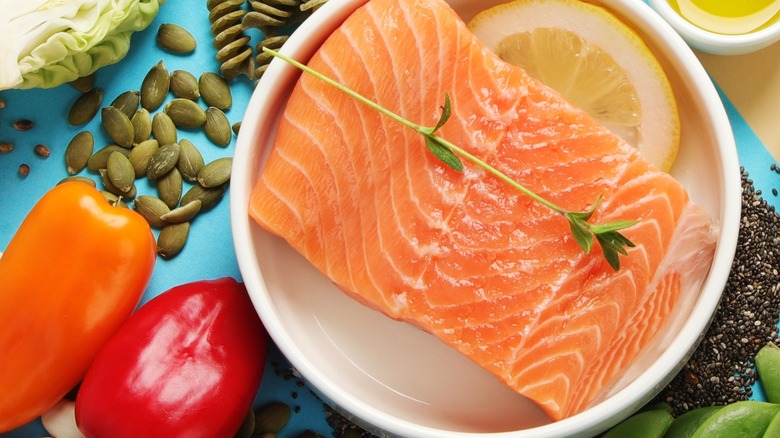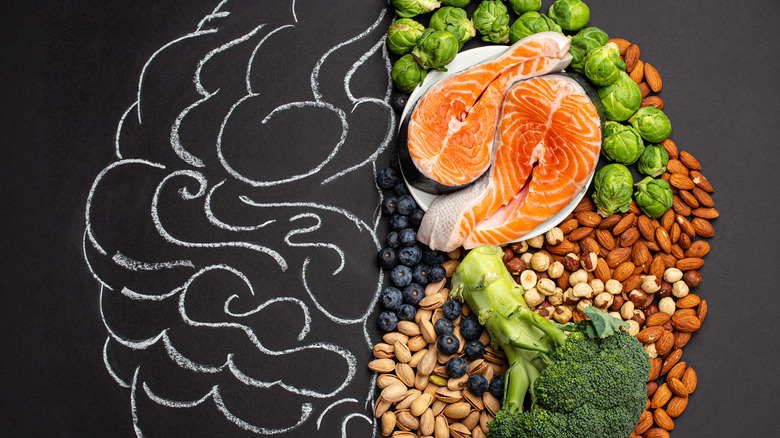All Of The Best Diets Of 2022 Explained
Have you ever wondered whether you're making the best dietary choices, or wanted to lose some pounds but ended up feeling overwhelmed by all the diet-related advice provided by friends and family (or even what you found online)? Well, you're not alone. According to a 2022 study published in Frontiers in Nutrition, diet-related online searches have significantly increased over the last two decades, and most often than not, people end up choosing fad diets over healthier eating patterns because they just seem to have it all figured out.
Nevertheless, fad diets are known for promoting short-term changes instead of long-term sustainable goals, and can thus do more harm than good. So how can you distinguish a fad diet from a nutritious eating pattern? Fad diets have one or more characteristics in common, including promising rapid weight loss, focusing on one type of food, eliminating any food groups, an inability to be maintained in the long run, questionable nutritional adequacy and scientific support, and failing to provide health warnings for people with chronic conditions.
In contrast, a healthy diet is characterized by being safe and easy to follow, including foods from all food groups to fuel and nourish your body, promoting long-term weight loss, and supporting overall health, from your brain to your heart and blood sugar control. These are the characteristics that, according to Forbes Health, can separate a fad diet from an A-grade type of diet worth trying. Here's all you need to know about the ten best diets of 2022.
These diets have a couple of things in common
The diets on this list are characterized by prioritizing the intake of fruits and vegetables, whole grains, and legumes, all of which are rich sources of fiber, a type of carb that your body can't digest, yet is still associated with numerous health benefits (via Healthline). In short, they promote the intake of nutrient-rich foods, limit highly processed ones, and help improve health outcomes.
Per a study in Nutrition Reviews, dietary fiber can help improve heart health by lowering high blood pressure and cholesterol levels, manage blood sugar levels by improving how your tissues respond to insulin (the hormone in charge of getting sugar from your blood into your cells), keep a healthy weight by promoting feelings of fullness, and improve gut health by feeding your microbiota (your gut's friendly bacteria), preventing constipation, and reducing the risk of colon cancer.
Furthermore, all of these foods pack a punch of additional nutrients and plant-bioactive compounds such as vitamins, minerals, and antioxidants, which is why they're sometimes referred to as functional foods — meaning they provide health benefits apart from the essential nutrients, per a 2021 review published in Foods. These compounds can provide anti-inflammatory, anti-cancer, anti-aging, anti-microbial, and immune-boosting properties to those who eat them. Lastly, by limiting highly-processed foods (which are typically high in unhealthy fats, sugar, and calories), these diets help reduce the risk of obesity, type 2 diabetes, and heart disease, as explained in a study in Cell Metabolism.
Mediterranean diet
Per a study in the International Journal of Environmental Research and Public Health, the Mediterranean diet is inspired by the typical eating habits of the countries that border the Mediterranean sea, such as Italy, Greece, and Spain. It is characterized by a high intake of olive oil and plant-based foods (such as fruits, vegetables, legumes, whole grains, and nuts), a low intake of eggs, sweets, red and processed meats, and dairy (except for yogurt and some cheeses), a moderate fish intake, and a low alcohol consumption, with red wine occasionally served with meals.
While the Mediterranean diet can provide up to 40% of its caloric content from fats, they come from healthy monounsaturated fat sources (like olive oil) instead of unhealthy saturated and trans fat sources like sweets and fried foods. In fact, due to these particular food choices, the Mediterranean diet is considered the gold standard in preventive medicine, a review in the journal Current Opinion in Clinical Nutrition and Metabolic Care says.
Following this diet can help boost heart health, increase life expectancy, improve quality of life, reduce the risk of certain types of cancer, prevent a decline in brain health, and lower the risk of obesity and type 2 diabetes. Want to give it a try? Start by making some easy food swaps, such as choosing brown rice or pasta instead of their refined versions, baked or grilled fish instead of fried chicken, and olive oil instead of butter or margarine (via Johns Hopkins Medicine).
Weight Watchers
Weight Watchers is a weight loss program designed to help you lose weight while guiding you towards healthier dietary choices.The diet works through a point-based system. Once you sign up and set your health goals, you'll get a personalized meal plan and are assigned a daily point budget. This system allows you to eat anything you want as long as you keep your food intake within your allotted points, meaning no food is off-limits. Generally speaking, healthier foods have fewer points. Thus, the Weight Watchers diet claims to guide you towards eating more nutritious foods and choosing the right portion sizes.
Since the program categorizes and grades foods based on their nutritional profile and promotes the intake of low-point foods, this diet tends to be high in fruits and vegetables, legumes, whole grains, low-fat dairy, and lean proteins such as fish and poultry. In contrast, it encourages you to limit high-point options such as fried or fast foods, sugary drinks, baked goods, and some dressings and sauces (via U.S Health News).
Following these recommendations improves your nutritional status and leads to weight loss. In fact, a review of 39 studies published in Annals of Internal Medicine found that people on this program lost 2.6% more weight than people on other types of counseling programs. However, point tracking can be tedious and time-consuming, which could increase the chances of quitting. In addition, a study published in Eating Behaviors shows that food tracking systems could trigger behaviors and attitudes linked to eating disorders in some people.
Noom
Noom is a commercial yet science-based diet that aims to help you lose weight by improving your relationship with food through mindfulness, habit tracking, and nutrition education (via Noom). Noom works via mobile app, and since it provides tools beyond weight and food logging (like step counting, water tracking, and daily behavioral lessons that promise long-term results), it calls itself a lifestyle rather than a diet.
Once you set up your goals, you get a personalized calorie and nutrient budget. However, it still allows full flexibility, as no foods are off-limits (per Noom). Noom helps you lose weight by creating a calorie deficit (you give your body less fuel than it needs, so it uses its fat storage instead) and classifying foods as green, yellow, or red depending on whether they are nutrient-rich or calorie-rich, promoting the intake of healthier foods (via Healthline). Green foods include fruits and vegetables, non-fat dairy and dairy alternatives, whole grains, and starchy vegetables. Yellow foods include lean meats, fish, legumes, seeds, grains, diet soda, and beer, while red foods include red and processed meats, sweets, nuts, snacks, and alcoholic beverages.
However, because of how its color system works, some nutritious yet calorie-rich foods (nuts, legumes, fatty fish, etc.) are grouped with less nutritious foods (e.g., beer, processed meats), which could easily lead to confusion. Furthermore, as Samantha Cassetty, MS, RD, told U.S. Health News, "the traffic-light system assigns a moral value to foods that may cause an unhealthy relationship with foods and trigger disordered eating."
DASH diet
As the National Heart, Lung, and Blood Institute (NHLBI) explains, DASH stands for Dietary Approaches to Stop Hypertension. This is an eating pattern designed to help lower your blood pressure and blood cholesterol levels — two risk factors for heart disease — by creating a heart-healthy lifestyle.
While it may sound like a commercial diet, the Dash diet was actually developed by researchers with the support of the NHLBI over 20 years ago (via NHLBI), and studies back up its beneficial effect in reducing said risk factors. For example, per a study published in The Journal of the American College of Cardiology, following the DASH diet showed a significant reduction in blood pressure compared to a low-sodium diet, and combining both the DASH and low-sodium diet led to even greater results, all in just four weeks.
The DASH diet focuses on choosing foods low in sodium and unhealthy fats and rich in blood-pressure-lowering nutrients such as fiber, potassium, calcium, magnesium, and protein. Therefore, it promotes the intake of fruits, vegetables, whole grains, low-fat dairy, legumes, nuts, seeds, and lean proteins like fish and chicken. In contrast, it limits fatty meats, full-fat dairy, sugary drinks, sweets, and tropical oils like coconut and palm oils (NHLBI). To make the transition to a DASH eating approach easier, the diet provides daily and weekly nutritional recommendations that tell you how many servings of each food group you should aim for. Additionally, it encourages lifestyle changes to improve heart health, like exercising, sleeping, and avoiding smoking.
Vegetarian diet
The main attribute of a vegetarian diet is the avoidance of meat products. However, there are six different types of vegetarian diets, some of which are more flexible than others regarding the intake of animal-based foods (via Healthline). Besides prioritizing plant-based foods, lacto-vegetarians include dairy, ovo-vegetarians eat eggs, lacto-ovo-vegetarians include both eggs and dairy, pescatarians include fish, and flexitarians occasionally eat animal meats. In contrast, vegans exclude all the previously mentioned foods, and even animal-derived products like honey.
Vegetarian diets are associated with numerous health benefits. For instance, a 2022 study in Frontiers in Nutrition shares that vegetarians have a lower rate of type 2 diabetes compared to non-vegetarians, which is attributed to the higher intakes of low-glycemic foods (the ones that don't spike your blood sugar levels despite providing carbohydrates) such as legumes, fruits, and veggies. In addition, vegetarians are considered more health-conscious and have lower body weight than meat eaters.
Nevertheless, a review published in the journal Proceedings of the Nutrition Society points out that due to their dietary choices, vegetarians have an increased risk of nutrient deficiencies, namely vitamin B12, heme iron, calcium, and the essential fatty acids docosahexaenoic acid (DHA) and eicosapentaenoic acid (EPA). This happens because plants don't produce these nutrients, or their absorption is limited compared to animal sources. In fact, vegetarians have higher chances of developing anemia than non-vegetarians, a condition that can occur due to iron or vitamin B12 deficiency (per U.S. Health News). Vegetarians also have an increased risk of bone fractures due to calcium deficiencies.
Vegan diet
Vegan diets are a sub-type of vegetarian diet that restricts all animal products and their derivatives. Per a study in Frontiers in Nutrition, there are also different types of eating patterns under the vegan umbrella. For example, while all vegans exclusively eat plant-based products, whole food vegans focus on whole grains, fruits and vegetables, legumes, nuts, and seeds, while limiting processed foods and added refined oils. In contrast, aside from restricting the use of added refined oils, raw vegans also avoid cooked foods, meaning that legumes and processed foods are a no-go as well.
According to a review in Nutrients, people who opt for a vegan diet often do so for ethical and environmental concerns. However, veganism is also linked to numerous health benefits. For instance, vegan diets promote heart health due to their characteristically high intake of fiber, antioxidants, and blood-pressure-lowering minerals like potassium and magnesium. Vegans also have a 24% reduced risk of heart disease compared to meat eaters. The diet helps manage body weight, blood sugar, and cholesterol levels.
Yet, despite their promising health benefits, vegan diets can easily lead to deficiencies in iron, vitamins D and B12, calcium, zinc, iodine, and omega-3 fatty acids. The reason behind vitamin D and B12 deficiency is that they're only found in animal sources. Regarding the remaining deficiencies, for the most part, they're caused due to the presence of anti-nutrients that hinder nutrient absorption. For this reason, oral food supplements and fortified foods are highly recommended for vegans.
Ornish diet
The Ornish diet is a low-fat, plant-based diet created by Dr. Dean Ornish in the '70s (via U.S Health News). Together with exercise, stress management, and love and support, the Ornish diet completes the four pillars of the Ornish Lifestyle Medicine Program, which claims to reverse heart disease, type 2 diabetes, and early-stage prostate cancer, aside from helping you lose weight, according to the diet's website. According to the diet's guidelines, higher intakes of fresh produce, whole grains, legumes, soy products, non-fat dairy, egg whites, and a limited amount of good fats are encouraged. In contrast, refined carbs, sweets, alcohol, and meat products are restricted. Therefore, the Ornish diet is essentially a lacto-ovo-vegetarian diet — a vegetarian eating pattern that allows for eggs and dairy.
Aside from the health benefits mentioned above, following the Ornish diet could also help reduce inflammation and improve brain and joint health (per U.S Health News). Nevertheless, the site points out that this is not a risk-free diet, seeing that you may need to take vitamin and mineral supplements to make up for potential calcium and vitamin B12 deficiencies. Similarly, the diet's website recommends taking fish oil and vitamin D supplements, as the low-fat component of the diet might not be enough to cover your needs.
Pescatarian diet
A pescatarian diet (also known as pesco-vegetarian or fish-vegetarian) is a primarily plant-based eating pattern that includes fish and other seafood, which make up most of its protein sources (via Healthline). According to a review published in Nutrients, by permitting the intake of fish, pescatarian diets are often rich in nutrients that are otherwise lacking in other types of plant-based diets, such as calcium, vitamin D, omega-3 fatty acids, B vitamins, zinc, iodine, and magnesium.
For this reason, and because they also limit highly processed foods such as red and cured meats and refined carbs, people following a pescatarian diet (also known as pescatarians) have a reduced risk of heart disease compared to meat-eaters. Furthermore, a study published in Diabetes Care found that pescatarians also have a lower risk of developing type 2 diabetes. Yet, despite the promising benefits of a pescatarian diet, you should note that it does come with a downside. As a review published in the journal Revista Medica Chilena explains, fish can become contaminated with the heavy metal mercury, interfering with its beneficial health effects. Thus, the Food and Drug Administration (FDA) suggests that pregnant and breastfeeding mothers avoid high-mercury fish, such as king mackerel, marlin, shark, orange roughy, swordfish, tilefish, and bigeye tuna.
MIND diet
According to a study published in the journal Alzheimer's & Dementia, dementia is the sixth leading cause of death in America. Thus, the MIND diet was developed to improve brain health by slowing down the progression of memory-impairing diseases.
MIND stands for Mediterranean-DASH Intervention for Neurodegenerative Delay, meaning that the diet takes two of the healthiest eating patterns, combines them, and adds brain-healthy foods to protect your brain. Both the Mediterranean and DASH diets are rich in wholesome, plant-based foods and low in saturated fats and processed foods. The difference between said diets and the MIND diet is that the latter highlights the intake of two specific foods: leafy green vegetables such as kale, spinach, arugula, and Bok choi, and berries (per Harvard T.H. Chan School of Public Health).
Researchers believe that the diet's high fiber and antioxidant content can help reduce inflammation and oxidative stress, which, in excess, can harm your brain and overall health. In addition, while the diet focuses on brain health, it can also reduce the risk of heart disease, diabetes, and certain types of cancer. Furthermore, the diet hasn't been associated with any health risks, it is easy to follow, and can also be followed if you're on a budget (per U.S. Health News).
Nordic diet
The Nordic diet is based on the eating patterns of Scandinavian countries, including Denmark, Norway, Finland, Iceland, and Sweden (via U.S. Health News). The main characteristics of this diet include its high intake of plant-based foods, including vegetables, whole grains like oats, rye, and barley, legumes, berries, and fermented or pickled foods. Yet, it also highlights the intake of fish, eggs, and a little dairy in the form of yogurt, while limiting the consumption of red meat and sweets. The Nordic diet strongly supports the use of locally-sourced products. Therefore, the main types of fish included in this diet are salmon, herring, mackerel, and sardines — all of which are incredibly rich sources of omega-3 fatty acids, which play an essential role in brain, hormone, lung, and immune health (per the National Institutes of Health).
According to a review published in Life, the intake of fermented foods such as yogurt, kefir, and pickled vegetables has been linked to improved gut health and immune response, which could lower the chances of developing chronic diseases like heart disease and diabetes. In addition, per a study published in Food and Nutrition Research, the high amount of fiber and fatty fish in this diet help reduce risk factors for heart disease, including high blood pressure and cholesterol levels, high blood sugar levels, and excess weight. Nevertheless, eating too many omega-3 fatty acids could lead to blood thinning or excessive bleeding in some people (via Healthline).
Choosing the right diet
If you're thinking about switching up your eating habits but don't know which diet would be your best fit, you should first ask yourself what your life and health goals are.
According to a study published in the journal Health, Psychology, and Behavioral Medicine, defining both sets of goals can boost your success on both fronts because life goals can heavily influence your health and dietary choices, and vice versa. For example, those with a life goal of exercising more were more likely to eat better, or a life goal of saving money could lead to a lower intake of fast and processed foods. Furthermore, Forbes Health explains that other factors, such as whether a diet is realistic and practical for you — a.k.a, does it align with your routine, budget, and personal taste? — and whether it is safe or backed up by science should also be considered when choosing the right diet.
In any case, remember that your diet doesn't have to be perfect! So, don't stress too much about it, and keep in mind that even the smallest change can get you one step closer to better health.













